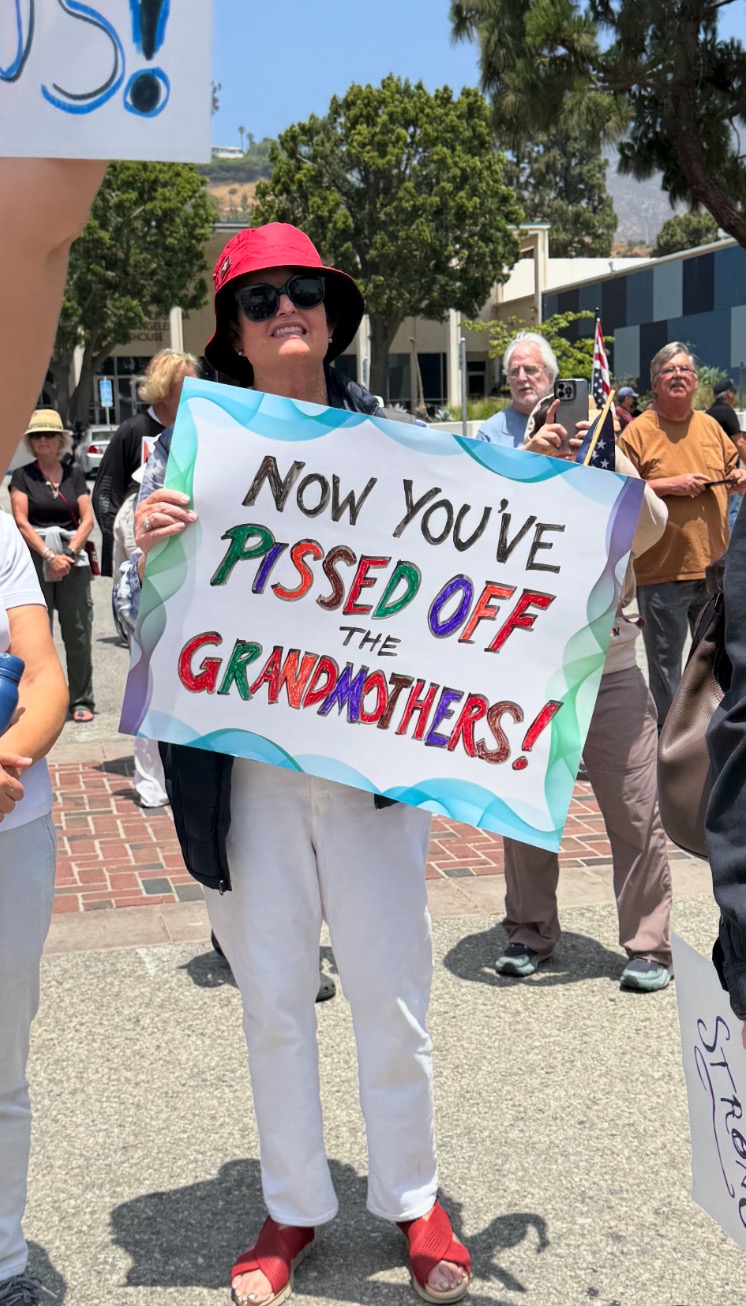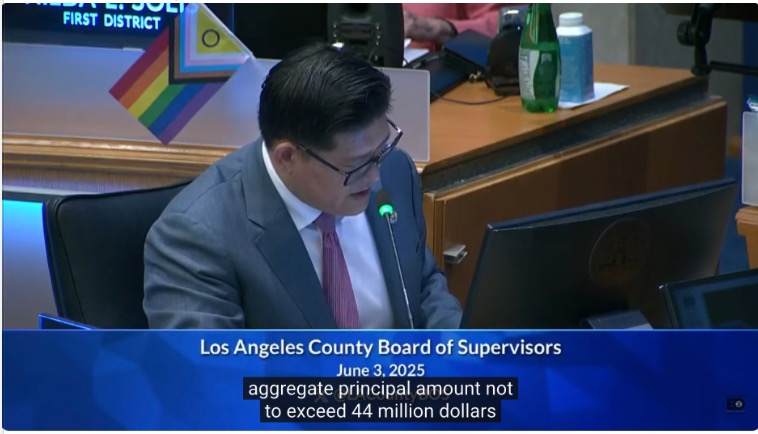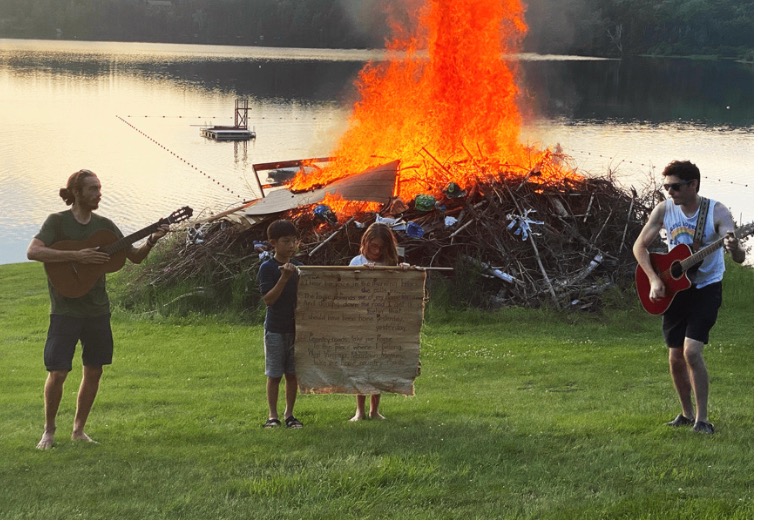Comments
ERIC PREVEN'S NOTEBOOK - Councilmember John Lee would like the public — and administrative law judge Ji-Lan Zang — to believe he was the designated Boy Scout on a Vegas bender that cost the City of Los Angeles a slice of its soul and $75,000 in hush money.
Testifying under oath in his long-delayed ethics case, Lee admitted to slipping $300 to nightclub buddy Andy Wang, but when asked about a second cash moment — a tidy $100 at dinner — his memory wobbled. He gave someone the money. Just not sure who. “Could’ve been Mitch,” he shrugged. “Could’ve been a waitress. Could’ve been... someone.”
Sure. Happens all the time. You’re out with Developer Christopher Pak, husband of former Ethics Commissioner Erin Pak, and Herby’s fixer squad, including Michael Bai, when suddenly, your hundred-dollar bill walks off. Right into the underpants of local legend Miss Velvet Ropes (not her real name, but close enough for Sergeant Duarte).
Let’s remember: this is the same John Lee who was the subject of a $75,000 taxpayer-funded settlement after a former female staffer alleged he made an upskirt joke and told her she “knew she wanted to bone a fireman.” She never withdrew the complaint. The city just paid her to go away.
So when Lee plays the wide-eyed innocent on the stand — “I don’t know who I gave it to” — it’s not just laughable. It’s part of a pattern. Selective memory is one thing. Selective accountability is another.
Dodger Recognition:

A team stands with it's fans...(though not yet, at press time)...

Word.
1984: Orwell ( ADU Olympics!)
Let’s say your cousin from Bakersfield needs a place to stay, so you pop up a shed in the backyard. A neighbor snitches. LADBS shows up. Boom: $356 for the “inspection.” Miss the deadline? It balloons to $1,246. Still late? A $660 Non-Compliance Fee lands like a flaming mattress.
Now you're hit with a $2,310 penalty, plus double the permit fee, never less than $400. Need more time? That’s a $343.44 Modification Fee, paid in person, of course. All told, you’re out over five grand before the lien even hits.
And who decides if that lien sticks? A judge? A jury of your shed-loving peers? Nope. Your City Councilmember—the very person who should have your back, not your wallet.
This week, nearly 400 properties in CD11, the district of Councilmember Traci Park, are up for nuisance abatement notices sent (maybe?) to the addresses that have already burned to the ground. It’s a beautiful bureaucratic flourish: “We regret to inform you, charred resident, that you are a blight.”
There’s no remote comment. No livestream. No audio. Just bulldozers and silence. The Board of Neighborhood Commissioners does allow remote comment, but the one committee that can lien your home? Show up, or shut up.
Is this a cleanup? Relief? No—this is “trim your trees or get a bill from Staffer B John Lee,” energy, now rebranded as “leave your debris, get a lien from MamaSan Traci Park.” Or maybe she’s planning to slide it all onto Blumenfield’s FEMA tab like some high-end dump-n-ditch.
This isn’t public service. It’s public extortion—disguised as civic duty, dressed in scrolls, and executed without appeal.
So here’s your friendly PSA from the Smart Speaker: If your place burned and you haven’t cleaned up, the city may be about to charge you for the privilege of being a victim.
No phone-ins. No second chances. Just fines, fees, and foreclosure.
Agenda here:
County Par Nine: A 64-foot putt to be heard

Edward Yen arranges the Board to go into closed session to shake the public.
City Hall abruptly canceled Friday’s meeting without explanation, and now over at the Hall of Discretion, aka the County Board of Supervisors, the June 17th agenda opens not with transparency, but with a full-blown Houdini act: nine closed session items.
Yes, nine.
That’s nine invitations to duck, cover, and confer with legal counsel, with labor reps, and with their own reflections on exposure to litigation. There are anticipated cases, threatened cases, and good old-fashioned performance evaluations. It's the full suite of executive hush.
So while the public agenda has some real meat on the bone—immigration crackdowns, fire recovery, LGBTQ+ youth protections, and a $23 million loan to LA-RICS—the Board will spend the first stretch of the morning shielding their deliberations from the very residents whose lives hang in the balance.
And remember: no explanation from City Council, and no explanation required here either. Just the usual polite nod toward “anticipated litigation,” followed by the sound of a door clicking shut.
City Buckles Up
The City Council is rolling out 54 agenda items on Tuesday, which should be plenty to pretend they’re not on autopilot. The meeting starts at 10:00 a.m., downtown at City Hall, aka the Fortress of Controlled Access, where public testimony is still barred from call-in. Why? Because getting downtown through the maze of potholes, construction, and LAPD staging zones builds character, and discourages participation.
That’s the point.
Despite the city’s love affair with “accessibility” and equity-themed presentations, they’ve yet to explain why, post-pandemic, they’re keeping the phones unplugged. Sure, they’ve got a Randomizer™ to pretend it's fair who gets to speak, but only if you’re willing to schlep in person, clear security, and survive the ambient mayhem.
As for the agenda? A generous helping of settlements, including a six-figure payout for LAPD misconduct (Item 24), a bonus round of streetlight installation funds (Item 38), and a motion to celebrate Música y Poemas long after the event already happened (Item 49). Item 26 urges support for federal immigration protections, just in time to be ignored by ICE.
And for dessert, Item 50: yet another motion about City Hall’s alleged commitment to anti-displacement and tenant protections. Let’s just say if applause could house people, we’d be fine.
So bring your water bottle, your patience, and a camera—because at LA City Hall, the performance is the policy. And don’t forget: if you’re stuck in traffic, it’s your fault for not planning ahead. Just like homelessness.

New York has a Tram, but many Angelenos don't want one for the Dodgers (McCourt).
Raising humanists (with a sense of humor)
I heard the Beach Boys singing "Sloop John B" the other day—probably a memorial spin now that Brian Wilson’s gone—and it dropped me straight back to Camp Treetops. Not just the tune, but the ache in it. "I feel so broke up, I want to go home." That was the whole emotional register of a real childhood: freedom, discomfort, homesickness, sweat, sun, and stubborn joy.
We ran barefoot all day at Treetops, building callouses on our young feet, learning about independence not from a textbook, but from bee stings and bad jokes and canoes that didn’t go the way we thought they should. Saturday nights were our big event—first the campfire sing-along, then a charge down to the Quonset hut, where we square danced with sweaty abandon, tripping over each other and laughing too hard to care.
It wasn’t curated. It wasn’t safe in the newfangled sense of the word. But it was good. It was formative. It was ours.
We didn’t call it resilience back then. We called it growing up. We called it Saturday night. We called it “Don’t fall into the fire pit.” But years later, when I couldn’t send my kids to The Camp Treetops—because time changes, because the other parent wasn’t aligned, because life is life—they still found a way.

The bonfire was fun (and a little risky)..
My son, during his gap year, went on an Outward Bound trip. At some point, they hit rough terrain. A brutal portage. Steep, uneven, the kind of trail that makes you question every decision that led to that moment. There was an older woman in the group who was struggling. And despite what I would describe as his own significant issues—and I say that lovingly—my son stayed with her.
He carried her gear. Maybe even her, for part of it. But more than that, he carried her spirit. He slowed his pace. He steadied her. He made sure she didn’t fall behind or fall apart.
When the counselor wrote me a letter after, describing what he’d done, I cried. Not just because I was proud, but because he got it. He got the message: taking care of yourself is not separate from taking care of someone else. It’s the same ethic.
Like they tell you on the airplane: oxygen mask on yourself first, then your child. Not because your life matters more. But because you can’t help anyone if you’re passed out on the floor.
That’s what happens when you give kids room to grow. Not when you script every move. Not when you call the cops because they walked to the store. We’re raising children like litigation risks, not like future humans.
We’ve lost the ability to tolerate uncertainty. To distinguish danger from drama. Today, a 10-year-old walking alone to the Dollar General in Georgia triggers a 911 call, a police response, and a mother in handcuffs. All because someone imagined a threat and decided imagination was enough.
That’s what Lenore Skenazy calls "worst-first thinking"—the idea that if you can picture something terrible, it’s already happening. It’s fear as default policy. And fear, left unchallenged, becomes cruelty.
I got a glimpse of that during COVID. I got vaccinated. I wore a bandana in public. But I refused to separate from my mother and Gary. That was my pod, my contract. My decision. And I lived with it.
Some people thought that was reckless. They said if I didn’t wear an N95 to the grocery store, I might kill someone’s grandmother. I said, if someone’s vulnerable, they should wear the N95. Transmission is mysterious. Also? If you can take your mask off to sip a Diet Coke on a plane, the virus isn’t following airline beverage protocol.
We replaced science with vibes and obedience. We replaced community with judgment. We replaced curiosity with control.
But raising a human being means accepting some mess. It means letting them fall, and letting them rise. It means being brave enough to let go of the fantasy that you can bubble-wrap your way to virtue.
Which brings me to Primo Villanueva.
His son said something that gutted me—in the best way. "I’m taking care of my dad so my kids will know what to do when my wheels fall off." That’s it. That’s the whole playbook. Raise humanists. With a sense of humor. People who show up. Who laugh. Who carry each other, sometimes literally, through the portage.
The kid with no shoes and a healthy risk appetite is the one who learned how to carry someone. That’s what we’re here for, isn’t it? To stumble around, laugh too hard, and lift each other when the trail gets rough.
(Eric Preven is a Studio City-based TV writer-producer, award-winning journalist, and longtime community activist who won two landmark open government cases in California.)













